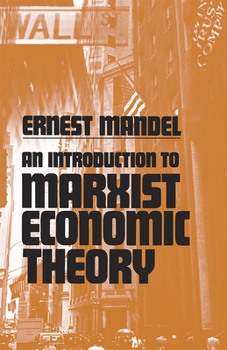An Introduction to Marxist Economic Theory
Select Format
Select Condition 
Book Overview
A concise presentation of the basic principles of political economy. Introduction by George Novack. This description may be from another edition of this product.
Format:Paperback
Language:English
ISBN:0873483154
ISBN13:9780873483155
Release Date:January 1973
Publisher:Pathfinder
Length:106 Pages
Weight:0.38 lbs.
Dimensions:0.3" x 5.4" x 8.4"
Customer Reviews
3 ratings
Laboring Masses v. Ruling Classes
Published by Thriftbooks.com User , 21 years ago
A remarkable little book that breaks down and makes crystal clear complex terms: surplus labor, necessary labor, necessary product, surplus product, surplus value, use value, exchange value, commodities, law of value, labor theory of value, etc.See how despite huge differences in social systems from slavery to feudalism to capitalism, a key fundamental is consistent: most of the value produced by toilers is ceded to a parasitic ruling class. According to the author, that will change only when the laboring masses ourselves become the ruling class. Read this introduction and then read Marx's Wage Labor and Capitol as well as his Value, Price and Profit.
How the system really works
Published by Thriftbooks.com User , 21 years ago
Workers are the ones who produce value. Bosses produce essentially nothing. The profits that bosses make are stolen from the workers This is a central insight of Marxist economics that this book does a good job of explaining. It also has an interesting discussion of "neo-capitalism" which is the form of capitalism that arose after World War II--capitalism that needed massive government intervention to survive. Mandel shows how war spending allows capitalism to avoid major depressions and how social programs blunt the effects of economic crisis on the workers, and thereby postpone revolutionary situations. It's especially interesting to read this book now, thirty years after it was written, since it makes a point of saying that the post-World War II prosperity would not last forever. It didn't and we've now entered a period of history where world economic depression, the rise of fascist movements, and attacks on social programs like welfare, social security, unemployment compensation, etc. are the norm. Mandel's book helps make sense of this miserable system so that we can chart a way forward to destroy it.
A Modern Classic
Published by Thriftbooks.com User , 25 years ago
This is probably the world's most read primer in orthodox Marxist economic theory - and deservedly so. It flawlessly covers all 'the basics': the theory of value and surplus value (ch.1); capital and capitalism [historical bacground, and basic dynamics] (ch.2); and neo-capitalism [role of the state & war] (ch.3). It does all this in tight, non-technical style. For this reason it is THE starting point for the uninitiated. It is important to note, however, that it cannot be more than it's title suggests: an introduction. It does not deal with the criticisms of Marx's theory of value in any depth. Also, it reveals not only its age, and how times have changed by what is emphasises AND what it ignores. In the case of what it emphasises: much is made of the importance of the cold war as a necessary phenomenon. In the case of what it ignores: it understandably says nothing of post-Fordism, ecological concerns, or the emergence of non-socialist oppositional 'social movements' (such as feminism, environmentalism and multiculturalism). These criticisms are hardly relevant to a book such as this: its central goal is to outline the essential message in Marx's 'Das Kapital', and to show (in ch.3) how this message can be applied (with some inevitable modification) to explain (then) current politico-economic events.






